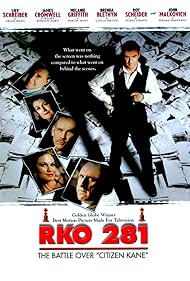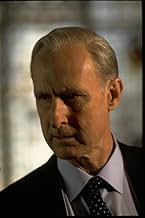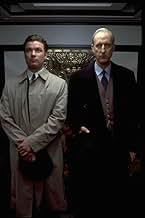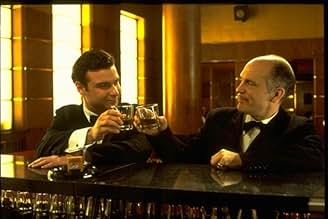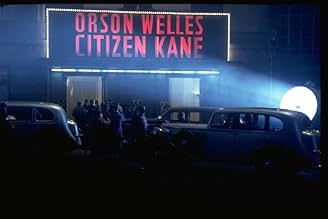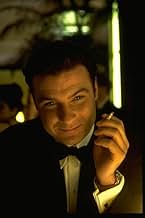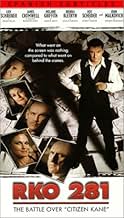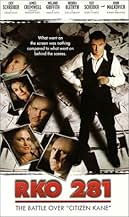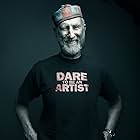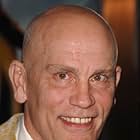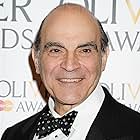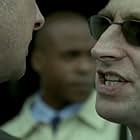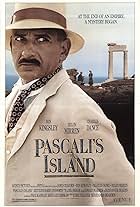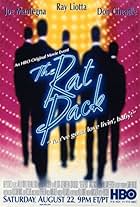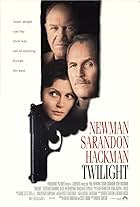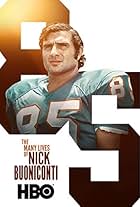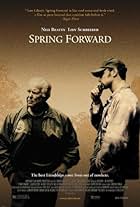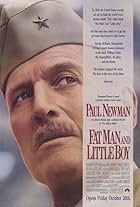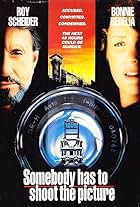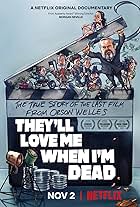IMDb RATING
7.0/10
6.6K
YOUR RATING
Orson Welles produces his greatest film, Citizen Kane (1941), despite the opposition of the film's de facto subject, William Randolph Hearst.Orson Welles produces his greatest film, Citizen Kane (1941), despite the opposition of the film's de facto subject, William Randolph Hearst.Orson Welles produces his greatest film, Citizen Kane (1941), despite the opposition of the film's de facto subject, William Randolph Hearst.
- Won 3 Primetime Emmys
- 15 wins & 28 nominations total
- Director
- Writers
- All cast & crew
- Production, box office & more at IMDbPro
Storyline
Did you know
- TriviaThe film shows RKO production chief George Schaefer announcing to Orson Welles and Herman J. Mankiewicz that he has lost his job on the very day of the opening of Citizen Kane (1941) in May 1941. In fact, Schaefer did not get fired until late in the following year, and this was less because he had promoted the film career of Orson Welles than because almost all the films RKO had made during his tenure had been flops.
- GoofsIn 1940, Disney was not the major studio it was today. It had few major releases by that date, all animated and all of which were released through other distributors. The meeting of studio chiefs depicted in the movie probably did not take place- certainly not in the form shown- but even if it had, Walt Disney would probably not have been invited. (Samuel Goldwyn, also shown as present, had sold his share in MGM to Louis Mayer years earlier, but was still a major producer.)
- Quotes
Orson Welles: I expected better of you, Mank.
Herman Mankiewicz: Me too, but I got used to it.
- Crazy creditsEpilogue: "Citizen Kane was released in 1941 to critical acclaim and box office indifference. William Randolph Hearst gradually withdrew from public life. Marion Davies continued to live with him as his mistress. Until his death in 1951, Hearst never permitted a single advertisement or review of Citizen Kane in any of his newspapers. Orson Welles struggled yet succeeded in making films for the rest of his life, including The Magnificent Ambersons, Touch of Evil and Chimes at Midnight. He died in 1985. Citizen Kane is widely considered the greatest American film ever made."
- ConnectionsFeatured in The 57th Annual Golden Globe Awards (2000)
- SoundtracksI Can't Get Started
Written by Ira Gershwin and Vernon Duke
Performed by Bunny Berigan
Courtesy of The RCA Records Label of BMG Entertainment
Featured review
The key to enjoying this film is in being able to divorce yourself from the idea that this is an accurate representation of the making of Citizen Kane. RKO 281 as a stand-alone film is not bad, though the short running time left me feeling like I'd only seen the primary colors of what could've been a rich piece of fiction.
And it does feel more like fiction than truth.
Watching RKO 281 as a Welles enthusiast was a struggle. Welles himself was such a unique *presence*, a magician in more ways than one, and Liev Schreiber just doesn't evoke the god-like charisma and fury that were manifestations of Welles' particular genius. I would've preferred Vincent D'Onofrio (who pulled off an excellent Welles in Ed Wood after only two weeks of preparation) or even Oliver Platt. It is important to get the "character" of Welles RIGHT in a movie about his masterpiece. If RKO 281 failed egregiously on any level, it's this one.
Though this film is about the MAKING of Citizen Kane, it doesn't address why Citizen Kane had such an impact later in its life. We know that Welles had to fight very hard to save his picture against a variety of political agendas. However, a hard-won battle does not a classic film make...on its own. The only clues we get from RKO character Welles are his passionate and other-worldly exclamations along the lines of, "I just KNOW this is the MOMENT for this story!--Everything I AM is in this film!", etc. It's too mystical for me, and I think it does an injustice to the efforts of Welles and his collaborators to suggest that it was simply the luck (and maliciousness towards Hearst) of a spoiled boy wonder that made what is widely considered to be the best movie of all time.
Welles was in a unique position during that era. He had carte blanche in the movie studios--a status unprecedented before or since--and had the means to create his vision fully to his specifications. Getting the picture *released* was nothing short of a miracle, however, and I think it would've been interesting to dive into yet another layer of what Citizen Kane represents: Art for Art's sake. It's heartbreaking to note that Welles' subsequent film The Magnificent Ambersons was butchered beyond recognition by the studio--those who were fortunate enough to view Welles original (and now lost) cut thought that Ambersons was his true masterpiece, that Citizen Kane was merely a warm-up (!!!). Can you just imagine what this man could've accomplished if only...?
Which brings me to William Randolph Hearst. RKO 281 barely scratches the surface of how powerful Hearst was at the time. The residual effects of his attempt to stop Citizen Kane's release were felt by the film industry (and by Welles in particular) for many years after, and I would've liked to see the nature of this confrontation more clearly.
I've often said that Citizen Kane was Orson Welles' bane and salvation, for we see in hindsight that he sacrificed himself (and ultimately his future)
to earn a beautiful and tragic place in cinematic history. Overall, I wanted an edgier, darker, and more complex account of RKO 281. If I remove all pre-conceived notions and expectations, I find that this docudrama is interesting and fun to watch, but ultimately, I cannot help being drawn back to what made this 1999 film possible: the tumultuous triumph of a long-shot movie as envisioned by a temperamental, inexperienced genius. There are many shadowy folds to the real story of Citizen Kane, and RKO 281 feels like a bowl of plastic fruit in comparison.
And it does feel more like fiction than truth.
Watching RKO 281 as a Welles enthusiast was a struggle. Welles himself was such a unique *presence*, a magician in more ways than one, and Liev Schreiber just doesn't evoke the god-like charisma and fury that were manifestations of Welles' particular genius. I would've preferred Vincent D'Onofrio (who pulled off an excellent Welles in Ed Wood after only two weeks of preparation) or even Oliver Platt. It is important to get the "character" of Welles RIGHT in a movie about his masterpiece. If RKO 281 failed egregiously on any level, it's this one.
Though this film is about the MAKING of Citizen Kane, it doesn't address why Citizen Kane had such an impact later in its life. We know that Welles had to fight very hard to save his picture against a variety of political agendas. However, a hard-won battle does not a classic film make...on its own. The only clues we get from RKO character Welles are his passionate and other-worldly exclamations along the lines of, "I just KNOW this is the MOMENT for this story!--Everything I AM is in this film!", etc. It's too mystical for me, and I think it does an injustice to the efforts of Welles and his collaborators to suggest that it was simply the luck (and maliciousness towards Hearst) of a spoiled boy wonder that made what is widely considered to be the best movie of all time.
Welles was in a unique position during that era. He had carte blanche in the movie studios--a status unprecedented before or since--and had the means to create his vision fully to his specifications. Getting the picture *released* was nothing short of a miracle, however, and I think it would've been interesting to dive into yet another layer of what Citizen Kane represents: Art for Art's sake. It's heartbreaking to note that Welles' subsequent film The Magnificent Ambersons was butchered beyond recognition by the studio--those who were fortunate enough to view Welles original (and now lost) cut thought that Ambersons was his true masterpiece, that Citizen Kane was merely a warm-up (!!!). Can you just imagine what this man could've accomplished if only...?
Which brings me to William Randolph Hearst. RKO 281 barely scratches the surface of how powerful Hearst was at the time. The residual effects of his attempt to stop Citizen Kane's release were felt by the film industry (and by Welles in particular) for many years after, and I would've liked to see the nature of this confrontation more clearly.
I've often said that Citizen Kane was Orson Welles' bane and salvation, for we see in hindsight that he sacrificed himself (and ultimately his future)
to earn a beautiful and tragic place in cinematic history. Overall, I wanted an edgier, darker, and more complex account of RKO 281. If I remove all pre-conceived notions and expectations, I find that this docudrama is interesting and fun to watch, but ultimately, I cannot help being drawn back to what made this 1999 film possible: the tumultuous triumph of a long-shot movie as envisioned by a temperamental, inexperienced genius. There are many shadowy folds to the real story of Citizen Kane, and RKO 281 feels like a bowl of plastic fruit in comparison.
- YesAlphaDiva
- Feb 7, 2003
- Permalink
Details
- Release date
- Countries of origin
- Language
- Also known as
- RKO 281: The Battle Over Citizen Kane
- Filming locations
- St. Pancras Renaissance Hotel London, Euston Road, London, Greater London, England, UK(staircase at Hearst Castle)
- Production companies
- See more company credits at IMDbPro
Box office
- Budget
- $12,000,000 (estimated)
- Runtime1 hour 26 minutes
- Color
- Sound mix
- Aspect ratio
- 16:9
Contribute to this page
Suggest an edit or add missing content

